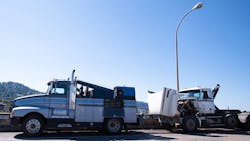Myths abound about full-service leasing. One such myth I’d like to address is that full-service leasing limits a fleet’s operational control and flexibility.
It may stem from the age-old in-source vs. out-source debate. This carried the connotation that since the outsourced service provider uses a for-profit business model, they add more costs. Therefore, service using an outside firm would cost more than fleets doing maintenance and repair themselves.
See also: Learning from Brake Safety Week violations
However, full-service leasing companies have continued to invest in state-of-the-art tools and equipment along with training and technology. This has resulted in their cost-to-service being lower than that of most internal shops, especially for smaller fleets that can’t afford to make these investments in tooling, equipment and training.
Full-service leasing gives fleets more flexibility and control because it takes away the hassles of fleet maintenance and allows them to concentrate on moving freight. Quality full-service leasing shops are focused on diagnosing, repairing and returning trucks to their customers as quickly as possible. A typical repair shop benefits when trucks are in the service bay, which results in billable hours and material charges. On the other hand, the full-service lessor is motivated to get the truck back to the customer quickly in order to fulfill its promise of maximizing uptime for the fleet.
Another benefit of full-service leasing is access to late-model, fuel-efficient rental trucks that are available to the fleet when its own assets are down for a prolonged repair or to add capacity because of seasonal or business-surge needs.
See also: The truth about cost per mile, leasing
Full-service lessors regularly invest in new equipment for their rental fleet and often are some of the first businesses to use the new technology coming into the market. This allows fleets to gain some experience with these technologies in their own operations, which can help them with their long-term decision-making about which technologies to spec on their trucks in the future.
As we move toward vehicle emissions reduction, fleets that have relationships with full-service lessors will be able to use rental equipment to gain firsthand experience with these alternative fueled vehicles and see how they perform in their duty cycles. Such opportunities can help fleets adjust for the future with greater flexibility and control.
Jane Clark is vice president of member services for NationaLease. In this position, she is focused on managing the member services operation as well as working to strengthen member relationships, reduce member costs, and improve collaboration within the NationaLease supporting groups. Prior to joining NationaLease, Clark served as area vice president for Randstad, one of the nation’s largest recruitment agencies, and before that, she served in management posts with QPS Cos., Pro Staff, and Manpower Inc.
About the Author
Jane Clark
Senior VP of Operations
Jane Clark is the senior vice president of operations for NationaLease. Prior to joining NationaLease, Jane served as the area vice president for Randstad, one of the nation’s largest recruitment agencies, and before that, she served in management posts with QPS Companies, Pro Staff, and Manpower, Inc.
